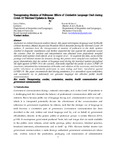| dc.description.abstract | Anchored on critical discourse analysis theory, this paper interrogates language used by Health Cabinet Secretary, Mutahi Kagwe and President Uhuru Kenyatta during the televised Covid-19 updates. It examines how the transgression of maxims of politeness in the daily updates resulted in linguistic impoliteness and further impacted the war against the pandemic across the country. Data for analysis and interpretation was obtained from purposively sampled televised daily updates from March 2020 to August 2020. To augment the data, social media postings and internet memes by Kenyans during this period were sampled and analysed. The paper demonstrates that the nature of language used during the televised updates prejudiced the fight against COVID-19 in the country, invariably impelled the public to shun COVID-19 recoveries, stimulated the victimization of families and relatives of the recoveries, and bred the public reluctance to voluntarily participate in mass testing and later, inoculation against COVID-19. The paper recommends that during pandemics, it is incumbent upon authorities, and necessarily so, to judiciously use gracious language for effective public health communication. | en_US |

